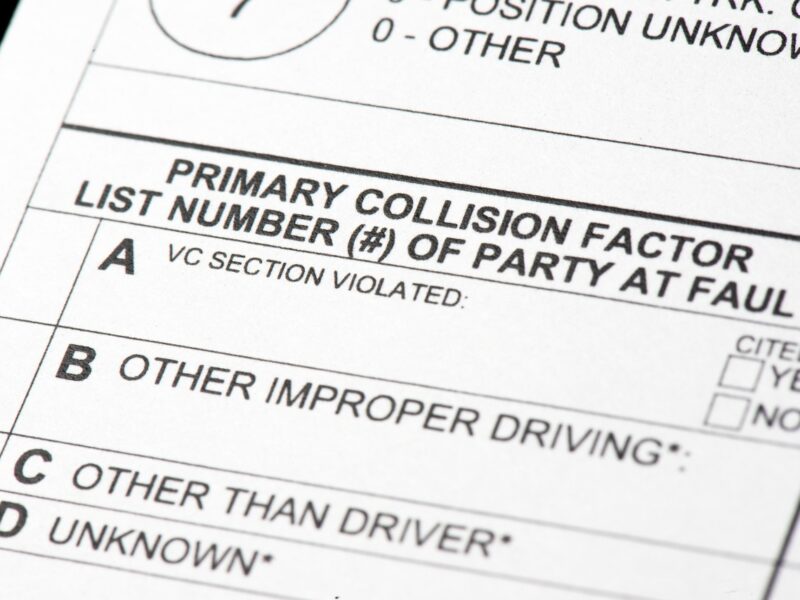In the aftermath of a car accident in California, obtaining a copy of the police report can be a crucial step for various reasons.
It serves as an official account of the incident, detailing the circumstances of the accident, the parties involved, and, in many cases, the responding officer’s assessment of fault. This document is often vital for insurance claims, legal actions, and personal records. This guide outlines the steps to obtain a police report for a car accident in California, ensuring you have the necessary information to proceed with your case.
Step 1: Determine the Reporting Agency
Often times, the officer will provide you with a paper slip that contains the police report number and information on how to obtain it. If you were not given a slip, follow these instructions. First, you need to identify which law enforcement agency responded to the accident. In California, this could be the local police department, the county sheriff’s office, or the California Highway Patrol (CHP). The agency involved usually depends on the location of the accident (e.g., within city limits or on a state highway).
Step 2: Wait for the Report to be Filed
It typically takes 10 days for the responding officer to complete and file the report, and sometimes longer. During this time, it’s important to gather any personal documentation, such as photographs of the scene and any property damage and injuries, contact information for witnesses, and your account of the event, which can be helpful when reviewing the official report.
Step 3: Request the Report
Each law enforcement agency has its own process for requesting accident reports. Generally, you can request a copy of the report in person, by mail, or, in some cases, online. The request process often will require you to provide the police report number that was given to you on a paper slip by the officer at the scene.
The requirements for obtaining a report can include:
Proof of involvement: Typically, you need to be a party involved in the accident, a legal representative, or an insurance company representative to obtain a copy of the report.
Request form: Many agencies require a completed request form that includes details about the accident, such as the date, location, and the names of the parties involved.
Fee: There is usually a nominal fee to obtain a copy of the report. This fee varies by agency.
Step 4: Provide Necessary Documentation
When submitting your request, you may need to provide certain documents, such as:
A photocopy of your ID.
Proof of your role in the accident (if not a party involved).
A written request or completed form provided by the agency.
Step 5: Review the Report
Once you receive the report, review it carefully for accuracy. It will contain information such as the date, time, and location of the accident, the names and contact information of parties involved, descriptions of the vehicles, a narrative of how the accident occurred, and possibly diagrams. It may also include the responding officer’s opinion on the cause of the accident and any citations issued.
Understanding Your Report
Police reports can be complex documents. If you have questions or if there are inaccuracies in the report, consider consulting a car accident lawyer. An experienced attorney can help you understand the report and any impact it may have on your claim, and advise on the next steps you may need to take.
Conclusion
Obtaining a police report after a car accident in California is a straightforward process, but it requires knowing where and how to request the document. This report is a key piece of evidence in managing the aftermath of an accident, from filing insurance claims to pursuing legal action if necessary. Ensuring you have a copy of the police report can help you and the insurers initiate the claims process and process of obtaining compensation.
By following these steps, you can obtain the necessary documentation to support your case and move forward with confidence, knowing you have the official account of the incident.
We offer California Car Accident Victims a Free Consultation, and there are No Attorney’s Fees Unless We Recover Compensation For You
At The Hassell Law Group, our legal team are experts in car accident law and personal injury law with over 100 years of combined legal experience, and experience matters. We stand up to aggressive insurance companies and have a history of obtaining award-winning results for our clients. We fight every step of the way to achieve the best possible outcome for our car accident clients. We work on a contingency fee basis, which means there is no risk in hiring our law firm. Unless we recover, we are not paid.
Contact us today to schedule a free consultation and case evaluation. We welcome your questions, and our legal team looks forward to helping you obtain just and proper compensation for your personal injury claim.
Read Next: Navigating the car accident claims process
The general information provided on this website should not be considered legal advice and does not constitute legal advice. For legal advice, you should consult directly with an attorney. If you contact us by telephone, email, letter, or by contact form submission through this website, please note that such communication does not create or constitute an attorney-client relationship. We cannot act as your attorney until we are hired as your attorney by a formal written agreement.


 How Long After a Car Accident Can Injuries Appear?
How Long After a Car Accident Can Injuries Appear?